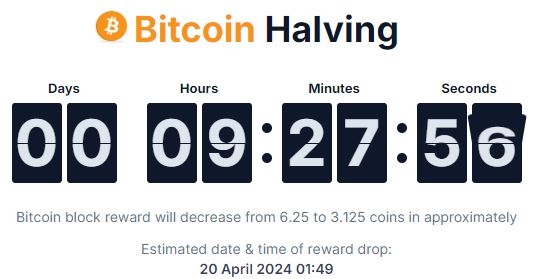Bitcoin Network Fees Soar as Runes Launch Nears
The hype around the new fungible token standard has reached a fever pitch ahead of the imminent Bitcoin halving.
By: Mehab Qureshi • Loading...
Blockchains
Transaction fees on the Bitcoin network have quadrupled, rising from $4 to $16 in the past week — largely due to Runes, a new protocol designed for creating fungible tokens on the Bitcoin blockchain.
The average Bitcoin transaction fee on Friday morning surpassed the transaction fees on Ethereum, which stood at $6, data from IntoTheBlock shows.
The Runes token protocol will go live with the imminent Bitcoin halving. This sets the stage for a battle for block space, as users race to mint the initial tokens and claim the most desirable names, which is likely to lead to a scramble among buyers to snap up these new tokens first.
The Runes protocol is set to debut at block 840,000.

Effect on Transaction Fees
The Bitcoin halving event scheduled for April 20 will cut the mining reward from 6.25 BTC to 3.125 BTC.
Presently, miners receive around 900 BTC each day, worth roughly $57.2 million based on current valuations. Post-halving, daily mining rewards will drop to around 450 BTC, thereby increasing the relative importance of transaction fees within the block rewards.
“As a result, miners are anticipated to depend more heavily on higher transaction fees and a potential rise in Bitcoin's price to counterbalance the anticipated dip in revenue caused by the reduced mining subsidy, especially in the short run,” said Ryan Song, head and analyst at CoinWestern Ventures, a Bitcoin mining consultancy firm.
Song suggests that with the expected reduction in block rewards due to the Bitcoin halving, miners will need to find alternative streams of income to maintain their profitability.
Bitcoin Earnings Surpass ETH
For the past three days, Bitcoin miners have earned more in transaction fees than Ethereum stakers.
Bitcoin miners have accumulated a total of $23.4 million in fees. In contrast, Ethereum stakers have earned $18.63 million during the same period, as indicated by data from Crypto Fees.
Bob Bodily, CEO of Bioniq, the world’s first Bitcoin-based Ordinals marketplace, told The Defiant, “Post-halving, we usually see an increase in hash rate as miners aim to capitalize on the higher block subsidy, followed by a drop as less efficient miners go offline. This halving is unique because of ordinals and ETFs.”
He noted that ETFs lead to more inflows, stating, "Ordinals give more revenue to miners from fees. Because of the inflow and more consistent fee market, this time, we won’t see as big of a hashrate drop as typically seen during halvings."
Ordinals and the Birth of Runes
Rodarmor's Bitcoin Ordinals introduced a way for unique, non-fungible metadata, termed "inscriptions," to be attached to individual satoshis. This move spearheaded a wave of NFT-like assets on the Bitcoin network.
In the aftermath, Bitcoin's activity soared to all-time highs. Ordinals gave rise to BRC-20s, enabling semi-fungible tokens, which only added to the frenzy.
Trading platforms globally are gearing up to list the primary tokens associated with the Runes protocol launch. Marketplaces, including decentralized exchanges (DEXes) like Magic Eden and centralized exchanges like OKX, have declared their intention to support Runes tokens right from the onset.
Advertisement
The Defiant Daily
“an industry must-read”
Get an edge in Crypto with our free daily newsletter
Know what matters in Crypto and Web3 with The Defiant Daily newsletter, Mon to Fri
90k+ Defiers informed every day. Unsubscribe anytime.